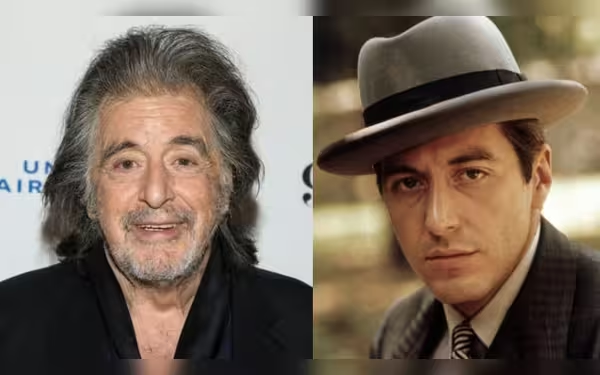Saturday, November 16, 2024 05:36 PM
Al Pacino Reflects on Casting Journey for The Godfather
- Al Pacino's unexpected casting journey for The Godfather.
- Director Coppola's unwavering support shaped Pacino's career.
- Pacino's connection to Sicilian roots through his grandmother.
 Image Credits: thenews
Image Credits: thenewsAl Pacino shares his unexpected casting journey for The Godfather, highlighting Coppola's support and his Sicilian roots.
In the world of cinema, few films have left as profound an impact as Francis Ford Coppola's 1972 classic, The Godfather. This iconic film, based on Mario Puzo's bestselling novel, not only redefined the gangster genre but also catapulted its cast into superstardom. Among them was Al Pacino, who portrayed the complex character of Michael Corleone. Recently, Pacino shared his reflections on the casting process in his memoir, Sonny Boy, revealing the surprising journey that led him to this legendary role.
Pacino's casting was not a straightforward affair. Initially, he was not the studio's first choice for the role of Michael Corleone, the son of the powerful mob boss Vito Corleone, played by Marlon Brando. However, director Francis Ford Coppola had a vision that included Pacino, despite the studio's reservations. In his memoir, Pacino recounted how his relationship with Coppola began in an unexpected manner. "Francis Ford Coppola had seen me on Broadway, and wanted to meet with me about a role. So I flew to San Francisco and for the next five days and nights, he took me to dinner and we talked about his film project over bottles of wine," he wrote.
Pacino described Coppola as a "leader, a doer, and a risk-taker," qualities that would ultimately shape the film's success. However, the road to landing the role was fraught with uncertainty. Pacino recalled, "I was an unknown, and the movie that Francis wanted to do with me got turned down everywhere. And I didn’t think I’d ever hear from him again." After months of silence, a phone call from Coppola changed everything. "First he told me he was going to be directing The Godfather. I thought he might be fantasising," Pacino shared.
Despite his initial disbelief, the offer was real. Coppola wanted Pacino to play Michael Corleone, a role that would become synonymous with his career. Pacino reflected on the improbability of the situation, stating, "For a director to offer you a role, over the phone, not through an agent, and this role of all roles — that was a hundred-million-to-one shot." He candidly admitted that he struggled to accept the opportunity, questioning his own worthiness for such a significant role.
As the casting process unfolded, it became clear that the studio had a different vision for Michael Corleone. Pacino noted, "Paramount didn’t want me to play Michael Corleone. They wanted Jack Nicholson. They wanted Robert Redford. They wanted Warren Beatty or Ryan O’Neal." The character of Michael was described in Puzo's novel as "the sissy of the Corleone family," which did not align with the studio's preferences for a more traditionally masculine actor.
Despite the odds stacked against him, Pacino's determination and Coppola's unwavering support ultimately prevailed. "But here’s the secret: Francis wanted me and I knew that. And there’s nothing like when a director wants you," he emphasized. This pivotal moment not only changed the trajectory of Pacino's career but also solidified The Godfather as a cinematic masterpiece.
In a touching moment, Pacino recounted the first person he called to share the news of his casting: his grandmother. "When I knew I had the role, I called my grandmother to tell her. ‘You know I’m going to be in The Godfather? I’m going to play the part of Michael Corleone.’ She said, ‘Oh, Sonny, listen! Granddad was born in Corleone. That’s where he’s from.’" This revelation connected Pacino to his Sicilian roots, providing him with a deeper understanding of his character.
Al Pacino's journey to becoming Michael Corleone is a testament to the unpredictable nature of Hollywood and the importance of believing in one's potential. His story serves as an inspiration for aspiring actors and filmmakers alike, reminding them that sometimes, the most extraordinary opportunities arise from the most unexpected circumstances. As we reflect on the legacy of The Godfather, it is clear that Pacino's portrayal of Michael Corleone will continue to resonate with audiences for generations to come.













